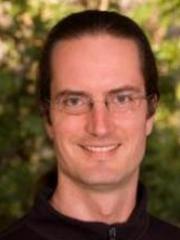Professor Benjamin Schulz

Primary research interest
Molecular systems glycobiology
About me
I graduated with a degree in Chemical Engineering and Science in 2000 from The University of Queensland, after which I joined Proteome Systems, an Australian biotechnology company. In 2004 I moved to the ETH Zurich in Switzerland for my doctoral studies. I joined the School of Chemistry & Molecular Biosciences as a University of Queensland Postdoctoral Research Fellow in 2008, and commenced an NHMRC Career Development Fellowship in 2012.
Research focus and collaborations
Our research focuses on the mechanisms, biological roles and applications in biotechnology of glycosylation, the most abundant and complex post-translational modification of proteins. Glycosylation is important in biological processes such as human development, cancer and microbial infection. This is because glycosylation is essential in biological activities as diverse as protein folding, fine-tuning protein enzymatic activity and determining protein-protein interactions. Half of all proteins are glycosylated, and a single protein can be modified by hundreds of different sugar moieties. The diversity of glycoproteins therefore requires that we take a systems biology approach in our research. All of our projects use a core set of methods in molecular biology, genetic manipulation, protein biochemistry, glycoprotein analysis and mass spectrometry.We aim to understand the mechanisms controlling glycosylation in these various systems to develop diagnostics, therapies, vaccines and applications in biotechnology.
Glycosylation in health and disease
Altered glycosylation is associated with cancer and infection. We aim to understand the mechanisms controlling this process using in vitro protein biochemistry, a yeast model system and human cells, to determine how it affects glycoprotein function.
Mass spectrometry glycoproteomics
Most proteins are modified with complex sugar groups that affect their function. We develop new mass spectrometry approaches to systematically and globally identify and quantify proteins and their sugar modifications in fundamental biology and disease.
Beer
Beer brewing is perhaps the most ancient biotechnology. We use modern analytical techniques to investigate and improve this complex and important process.
Group members
- Dr Cassandra Pegg, Postdoctoral Research Fellow
- Dr Lucia Zacchi, Postdoctoral Research Fellow
- Mr Kent Yeo, PhD Student
- Ms Danila Elango, PhD student
- Mr Edward Kerr, PhD student
- Mr Xinle Tan, PhD student
- Mr Toan Phung, PhD student
Funded projects
- ARC Centre for Biopharmaceutical Innovation 2017-2021.
- NHMRC Project Grant 2017-2020. Microevolution in Cryptococcus neoformans.
- ARC Discovery Project 2016-2018. Moonlighting from sugar to metal.
- NHMRC Career Development Fellowship 2015-2018. How Sweet It Is: diagnostic clinical and experimental glycoproteomics.
Teaching interests
- BIOC2000 Biochemistry and Molecular Biology
- BIOC3000 Advanced Biochemistry and Molecular Biology
- BIOL3004 Genomics & Bioinformatics
- BIOT7018 Biologics
- BIPH2000 Foundations of Biophysics
- SCIE2020 CSI UQ: Introduction to Forensic Science
- BIOC6007 Directed Studies in Biomolecular Structure & Function
Achievements and awards
- ASBMB Bioplatforms Australia Award 2015
- ASBMB Eppendorf Edman Award 2015
Featured publications
- Yeo, K. Y. Benjamin, Chrysanthopoulos, Panangiotis K., Nouwens, Amanda S., Marcellin, Esteban and Schulz, Benjamin L. (2016) High performance targeted mass spectrometry with precision data independent acquisition reveals site-specific glycosylation macroheterogeneity. Analytical Biochemistry, 510 106-113. doi:10.1016/j.ab.2016.06.009
- Kerr, Edward D. and Schulz, Benjamin L. (2016) Vegemite beer: yeast extract spreads as nutrient supplements to promote fermentation. Peerj, 4 . doi:10.7717/peerj.2271
- Zacchi, Lucia F. and Schulz, Benjamin L. (2016) SWATH-MS glycoproteomics reveals consequences of defects in the glycosylation machinery. Molecular and Cellular Proteomics, 15 7: 2435-2447. doi:10.1074/mcp.M115.056366
- Zacchi, Lucia F. and Schulz, Benjamin L. (2015) N-glycoprotein macroheterogeneity: biological implications and proteomic characterization.. Glycoconjugate Journal, 1-18. doi:10.1007/s10719-015-9641-3
- Arras, Samantha D. M., Chitty, Jessica L., Blake, Kirsten L., Schulz, Benjamin L. and Fraser, James A.(2015) A Genomic Safe Haven for Mutant Complementation in Cryptococcus neoformans.. PLoS One, 10 4: e0122916-e0122916. doi:10.1371/journal.pone.0122916
Researcher biography
I graduated with a degree in Chemical Engineering and Science in 2000 from The University of Queensland, after which I joined Proteome Systems, an Australian biotechnology company. In 2004 I moved to the ETH Zurich in Switzerland for my doctoral studies. I joined the School of Chemistry & Molecular Biosciences as a University of Queensland Postdoctoral Research Fellow in 2008 and NHMRC Career Development Fellow in 2012. I am now Associate Professor in Biochemistry.
